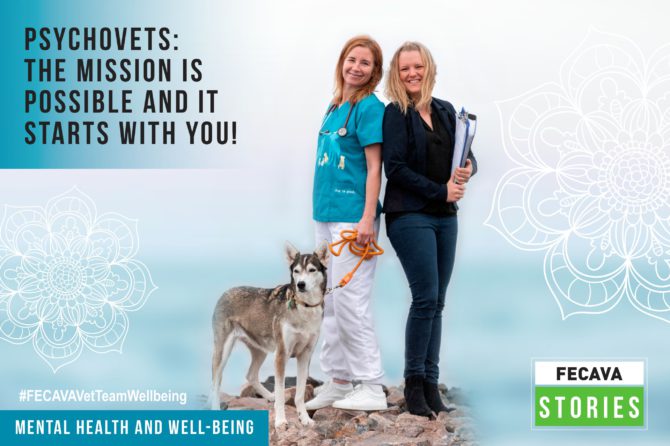
Psychovets: The Mission is Possible and it Starts with You!
We need both better individual self-management and better colleague support within the profession. You know those dogs who come limping into the clinic, wagging their tail, big smile on their happy face, although they’re in a lot of pain? That’s us vets.
We are constantly in character at work. We might have sleep deprivation, we might be dealing with death and grief in one minute and the joy over a new pup the next, we might have had to accomodate a difficult client, we might be struggling with a difficult case, or conflicts between staff. But in spite of all this, we put on a big smile, get on stage, and welcome the next client, the next case. Because we love what we do! And we should, being a vet is a lot of fun and extremely satisfying in many ways. We hardly ever have a boring day at work! But a lot of us continue being in vet character all the time. We are responsible, caring and academic, and all the smiling and tail wagging we perform might stop us from realizing that we are actually quite exhausted.
Maintaining a healthy work/life-balance is crucial. Your personal time should be at least equally important to you as your work. Sounds easy, we know it’s not. Still, it’s just a fact that our minds need a break to be able to reset. Do not read work related emails and patient test results or answer calls from clients on your own time! Get out of vet character and don’t let work related problems constantly spin around your brain.
You might also have other roles to play in your life, like being a responsible, patient and loving parent or husband/wife. To avoid draining your energy level, it’s important that you also allow yourself to be, well, just you. You are more than a vet!
Make space for what makes you happy. You need to spend time with friends and family, and you need to have a hobby outside of work that gives you energy. Do not think things will get better next week, month or year, and that you will have more time for this later. Your life is now. Do you enjoy hiking, yoga or volleyball? Does watching the ocean make you happy? Or perhaps a cup of tea and a book or even a silly magazine makes you calm down? Then do that. It doesn’t matter what it is, you need to do whatever boosts your energy level. You’re the only one who can make time for this.
Do one thing at the time, and clear away unnecessary interruptions. Tell assisting staff to leave you alone when you write your journals. Do not take phone calls or write prescriptions if you are already half an hour behind schedule. Our days in the clinic are unpredictable, which makes it even more important to plan how the team should work and what should be prioritized. You can’t do everything at the same time, even if multitasking is one of your strengths!
Be a good colleague. Do not criticize other vets in front of clients, ever. Your colleagues are also struggling with tough cases, difficult clients, financial issues and stressful work environments. We’re all in the same boat. So do not rock it. Please make a phone call or send an email to a colleague if you think they did a really bad job on a case. But do not say so to the client. Your only achievement will be to have weakened clients’ trust in vets in general. Talk nicely about your fellow vets, also to staff members.
Accept that you are not perfect, and neither are your coworkers. We all make mistakes, or we wouldn’t be human. And sometimes 80% is good enough. You can’t perform perfectly every day, all the time. Talk to your colleagues about this. Wouldn’t it be great if we at least could lower our shoulders within the profession, and feel that we have each others’ back? It’s enough having to keep our guard up in relation to client gossip and complaints. We have to cheer on each other. Refer the patient if the case is too advanced for you. If you receive referred patients; make sure you treat the referring vet nicely. Even if we sometimes work in competing businesses, speaking well of each other will help the whole profession to flourish.
The misson is to remove veterinarians from the top of the suicide statistics. We truly believe it is possible. But we have to make the change ourselves. Be the change you wish to see!
Leave a reply

Dear Carina,
ReplyThank you very much for your comment! We strongly agree with your opinion on the theatre owners and production managers. That topic could surely fill an entire blogpost itself.
In Norway, the clinic owners are actually, by law, obligated to provide a healthy working environment, including psychosocially. Nevertheless, this is only achievable if both parts (both the coworkers and leaders) are involved in shaping their own working place. We encourage all clinics and their staff to discuss these issues together, and try to find an agreement on some common standpoints.
We need the vets to thrive in their jobs, and we all have a role and responsibility in this progress.
Best wishes,
Psychovets
(Instagram: @psychovets).
Dear Dennis,
ReplyThank you so much for your kind response. We are very pleased to hear that you are actually writing a book on the struggles of being a vet! All the tv-series and media attention are usually highlighting the glamorous part of being a vet; the snuggling with cute puppies and kittens, happy owners and a happy ending. What they don`t show on tv are the hard parts; working long-hours, sleep deprivation due to on-call duty, professional isolation and high workload, to name a few. Most of us really enjoy our work, but it is crucial to give a balanced view of our profession, to create a base of understanding amongst animal owners of how much this job actually comprises. We really hope that you succeed in publishing your book – we would really like to buy a copy when it is available.
Best wishes,
Psychovets
(Instagram: @psychovets)
Dear Dennis,
ReplyThank you so much for your kind response. We are very pleased to hear that you are actually writing a book on the struggles of being a vet! All the tv-series and media attention are usually highlighting the glamorous part of being a vet; the snuggling with cute puppies and kittens, happy owners and a happy ending. What they don`t show on tv, are the hard parts; working long-hours, sleep deprivation due to on-call duty, professional isolation and high workload, to name a few. Most of us really enjoy our work, but it is crucial to give a balanced view of our profession, to create a base of understanding amongst animal owners of how much this job actually comprises. We really hope that you succeed in publishing your book – we would really like to buy a copy when it is available.
Best wishes,
Psychovets
(Instagram: @psychovets)
I like how you mentioned that it is important to have valuable experience for your career. My cousin mentioned to me last night that she wants to pursue her career as being a veterinary and asked if I have any idea where she can have an internship for experiences. Thanks to this informative article, I’ll be sure to tell her that she can consult a well-known animal care center as they can answer all her inquiries.
ReplyA crucial message for veterinarians. How can collaboration and support among veterinarians help alleviate pressure and stress in the profession?
visit us: <a href="https://dce.telkomuniversity.ac.id/pelatihan-simulator-iot-untuk-siswa-smk-nasional-bandung/">Tel U</a>
Reply